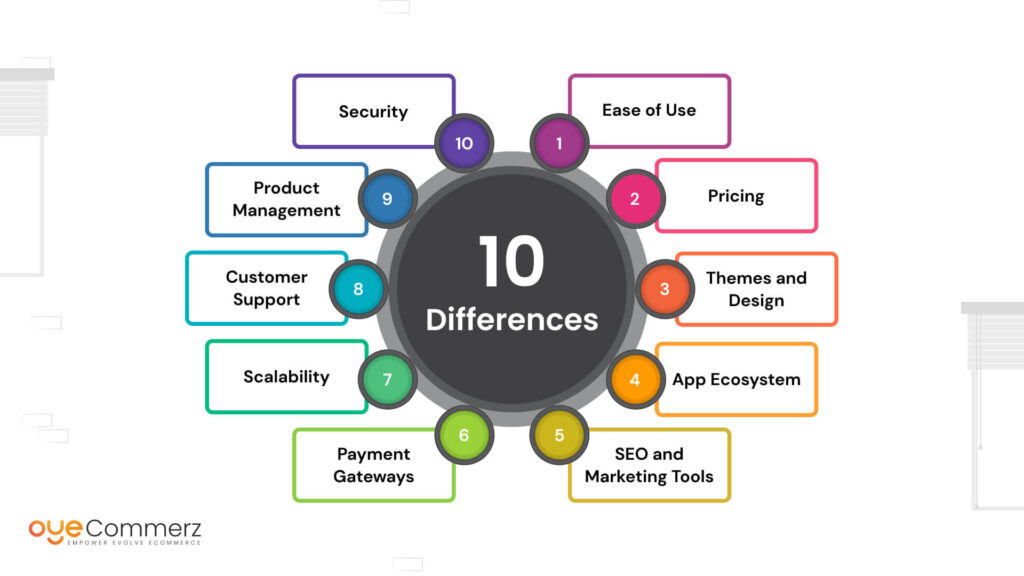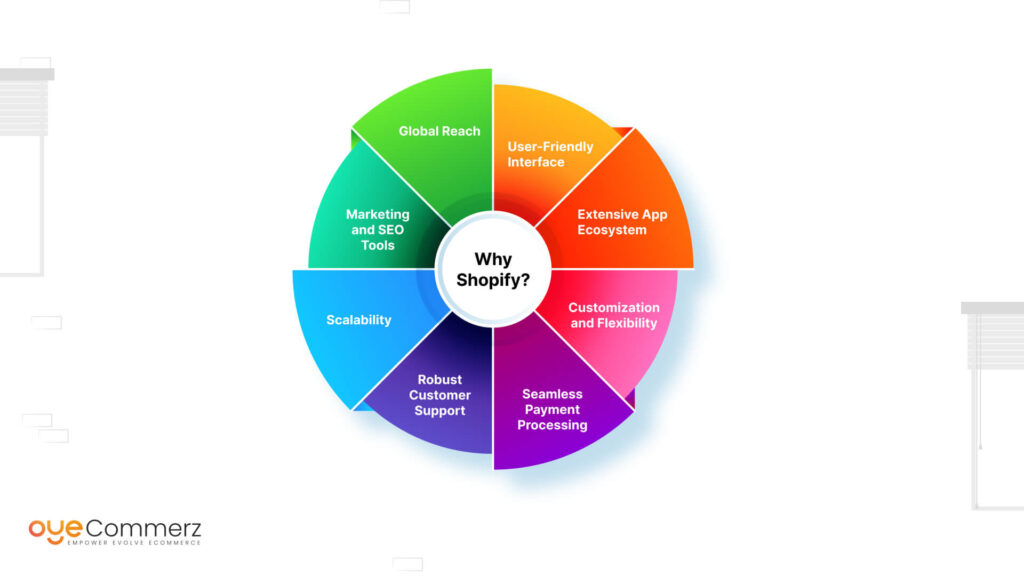As a new business owner are you trying to decide between Shopify and BigCommerce for your online store? The right platform can make or break your eCommerce success, but with so many features to compare, it’s easy to feel overwhelmed. In this blog, we’ll break down the key differences between Shopify and BigCommerce to help you choose the best fit for your business. By the end, you’ll have a clear understanding of which platform can boost your sales, streamline your operations, and support your long-term growth. Let’s dive in and uncover the perfect match for your business in just a few simple steps!
Table of Contents
ToggleOverview - Shopify and BigCommerce
Shopify
Shopify is a more popular hosted solution for selling products online, which is easy to use, highly customizable, and a favored app store. It targets small companies, mid-sized firms, and even the giant conglomerates. Shopify is a complete multi-tool for creating and running an online store that includes web templates, a payment gateway, an inventory control system, and advertising options. Shopify provides hosting for the stores, and stores security – store owners do not need to have their servers to address those issues.
BigCommerce
Another common E-Commerce platform is BigCommerce – this is another strong platform to sell online. It is famous for its capability and it has many built-in features which are advantageous for growing and well-established organizations. Some of the advantages it has to offer include various themes that clients can request to be developed, SEO tools, and the ability to manage products. Similar to Shopify, BigCommerce is an online solution, which means it can ensure secure hosting. It aspires to act as a one-stop app that conserves users’ space and time by leaning on third-party apps to the minimal extent possible.
You can also check out: Shopify’s Features vs. BigCommerce’s Features
Stats Comparing Shopify and BigCommerce
Market Share
As of February 2023, Shopify held a 22% market share among all websites using e-commerce technology, while BigCommerce accounted for 7.41%.
Users
By February 2023, Shopify boasted over 2 million daily users, whereas BigCommerce had around 1 million users in total.
Themes
Both platforms offer mobile-friendly themes, but Shopify is known for superior design and usability. Shopify provides over 70 themes, while BigCommerce offers 150.
Scalability
BigCommerce is designed for growth, supporting up to 600 SKUs and 250 options per product. In contrast, Shopify has limits on API calls per second, SKUs per product, and product options, which can pose challenges as your business expands.
Shopify Vs. BigCommerce: 10 Significant Differences

While comparing Shopify and BigCommerce, there are several factors you need to consider to enable you to arrive at the right decision. Here are ten major differences between these two platforms:
1. Ease of Use
- Shopify: Shopify is relatively easy to use which comes in handy when running an online store by beginners. The setup can be completed quickly, and the interface of the dashboard is rather simple and clear.
- BigCommerce: On the other hand, BigCommerce also has a fairly intuitive function, yet it may be less user-friendly as its functionality contains many integrated characteristics. This may also result in a situation whereby different users learn how the gadget works at different levels, and this might take time especially when many new users need to use it.
2. Pricing
- Shopify: Pricing of Shopify starts with the basic Shopify plan at $29 per month, and the highest being the advanced Shopify plan at $299 per month. Third-party apps come at an extra charge along with transaction fees unless when one is a Shopify Payments user.
- BigCommerce: Pricing begins at 29 USD. It has a standard plan for $95 per month and an advanced plan that costs $299. 95 per month for the Pro plan. Finally, some of the aspects of BigCommerce are built into its base plans, thus minimizing the use of third-party apps. It also maintains no extra transaction charges.
3. Themes and Design
Shopify: Offers a huge selection of professionally created templates, some of them available for free, while others come at a price. The themes are very versatile, and in terms of changes, Shopify is working with the theme editor which is very handy, with abilities for random changes.
BigCommerce: Lesser in number of themes than Shopify with some of them being free while others not. Another thing that should be noted is that the themes in BigCommerce are also adjustable, although the choice of designs may not be as large as in Shopify.
4. App Ecosystem
Shopify: Shopify is famous for its vast app store with lots of apps and integrations that you can add to your store. This ecosystem also lets the store owners add elements as per their preference.
BigCommerce: BigCommerce also offers a majority of native features; however, the number of apps in its app store is relatively limited compared to that of Shopify. However, the platform of the site itself contains many of the necessary elements and thus the use of applications is minimal.
5. SEO and Marketing Tools
Shopify: It offers fairly good SEO features and the marketing options are also fairly good with things such as SEO-ameliorated URLs meta descriptions and even social media buttons. Shopify also provides features for several marketing applications to help you in your promotions.
BigCommerce: Outperforms all competitors in terms of Search Engine Optimization, and is equipped with such features as unique URL formats, efficient site mapping, and comprehensive analytics. There are several marketing tools integrated into BigCommerce that include; Abandoned cart recovery, email marketing, and others.
6. Payment Gateways
Shopify: Allowance for more than 100 of the gateways, including such popular ones as PayPal, Stripe, and Amazon Pay. Some of the platforms’ features include; free transactions with the use of Shopify Payments, the platform’s in-built payment processing system.
BigCommerce: Also supports a plethora of payment gateways for convenience, currently, there are over 65 payment gateways. BigCommerce does not have other transaction charges, irrespective of the payment gateway chosen for the business.
7. Scalability
Shopify: Adaptable for businesses as it has upgraded plans, and Shopify plus for high enterprise-level needs. Its implementation does not complicate the handling of high traffic or high sales traffic as well.
BigCommerce: BigCommerce is known to be most suitable for big startups and growing businesses through its scalability. It has stable and powerful servers to accommodate large and increased flow and large catalogs of products.
8. Customer Support
Shopify: offers live chat support, sending an email or calling Customer Support at any time of the day. Shopify also has fairly robust help documentation and, of course, a help section with a forum.
BigCommerce: Supports customers through phone, live chat, and email which are available round the clock. In addition to that BigCommerce also has a knowledge base, community forum, and several other online tools to support the users.
9. Product Management
Shopify: It is easy to manage products through for example making of bulk product uploads, product inventory management, and variants. Digital products and subscriptions are also supported by Shopify.
BigCommerce: Outshines all other plans for product management with add-on features like an unlimited number of products, custom fields, and complicated product rules. It can be concluded that BigCommerce most suitably serves stores with extensive and diverse product offerings.
10. Security
Shopify: Offers a strong security measure such as Secure Socket Layer certificates, payment Card Industry compliance, and Security updates frequently enough. Security and hosting are taken care of by Shopify so it provides a secure shopping experience to customers.
BigCommerce: Also, provides excellent security with SSL certificates, PCI compatibility, and DDoS protection. The security aspects of the hosting environment are well managed, meaning that the customers’ information is safe when using BigCommerce.
Why Shopify is Better for Your E-Commerce Business?

While both Shopify and BigCommerce have their merits, Shopify stands out for several reasons that might make it a better choice for your e-commerce business:
1. User-Friendly Interface
Third, are real customer reviews, which show that Shopify comes with an easy-to-use, simple, and user-friendly interface which is great for novices and non-IT people. The process of setting up the store and the layout of the interface is rather intuitive, so for anybody who has no prior experience in using any type of e-commerce platform, the process will be very easy.
2. Extensive App Ecosystem
It’s easy to expand the capabilities of your store since Shopify App Store offers millions of apps. You can get anything from enhanced marketing tools, accurate inventory solutions, or customer care support apps among others if you need them.
3. Customization and Flexibility
Most of the Shopify themes are professionally designed, it also provides the ability to edit the themes through the paid theme editor. It means that you can develop a store that is stylistically different from your competitors but corresponds to your brand’s vision and values.
4. Seamless Payment Processing
Shopify Payments helps make payments rather easier since they are built into your store platform. This nullifies the transaction costs and offers the most convenient payment process to the buyers or customers. Further, Shopify integrates multiple other payment processors which can instill versatility in the payment method selection for you and your clients.
5. Robust Customer Support
Customer care is always available with Shopify; hence you get all the assistance you need at any time of the day. Additional resources include the platform’s help center, which provides various materials, a community forum for getting advice and help from other users of the platform, and education modules that help in your e-commerce journey.
6. Scalability
Shopify also can grow side by side with your business. There is the advanced plan and Shopify Plus, which is the enterprise-level service aimed at merchants with increased sales. It is a great feature that Shopify can handle all the traffic and sales, so your store will always be fast.
7. Marketing and SEO Tools
But, Shopify also offers an efficient set of marketing and SEO options that will help attract more customers and, therefore, earn more money. Shopify features such as the URL structure to how your store is indexed on search engines, social media integration, and marketing application tools are provided.
8. Global Reach
It provides the facility of multi-currency and multi-lingual support so it is capable of reaching out to customers all around the world. Such a large coverage is also useful for those interested in increasing their market share and gaining clients from other countries.
Migrate Your Business to Shopify with OyeCommerz!
Switch to Shopify for cutting-edge SEO tools, quicker page loading, extensive app integrations, and superior multi-channel sales capabilities. Enjoy Shopify’s intuitive interface, enhanced customization options, and comprehensive analytics to boost your store’s performance.
Rely on OyeCommerz for expert BigCommerce to Shopify migrations. Our precision, speed, and deep platform expertise guarantee a seamless transition, setting your store up for immediate and sustained growth. Contact us today!
Contact to Migrate your Site to Shopify Now
Conclusion
Selecting an appropriate e-business is strategically significant for your venture. Both Shopify and BigCommerce are enriched with profound tools and facilities but are suitable for different solutions. Thus, the high level of flexibility and scalability makes Shopify the most suitable one due to its easy navigation, availability of many apps, and great opportunity for customization. It shines in payment processing, customer service, and marketing features for any small to large businesses. Scalable, BigCommerce has many built-in features making it suitable for large stores with many products avoiding the use of third-party apps. Preparing for migration from Shopify to BigCommerce is based on the comparison of BigCommerce’s intended features and growth possibilities versus Shopify’s versatility and international presence. Therefore, the decision as to which is the best platform largely depends on the probabilities of the case in question. Considering the characteristics of both platforms it will be possible to make the right decision that will meet the business needs and pursue sustainable development.


